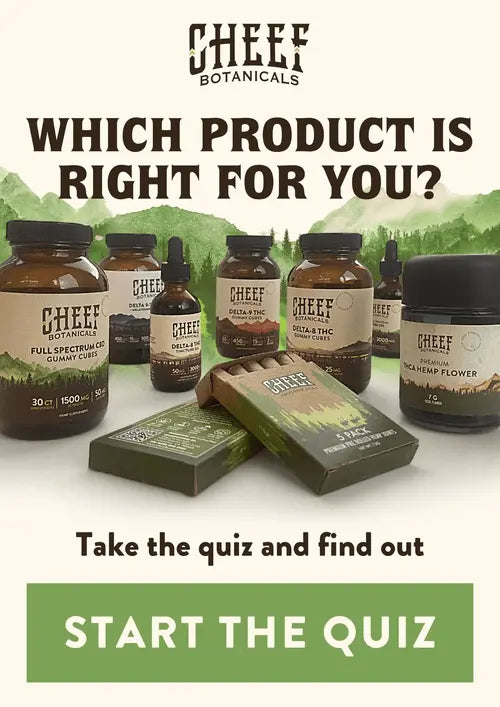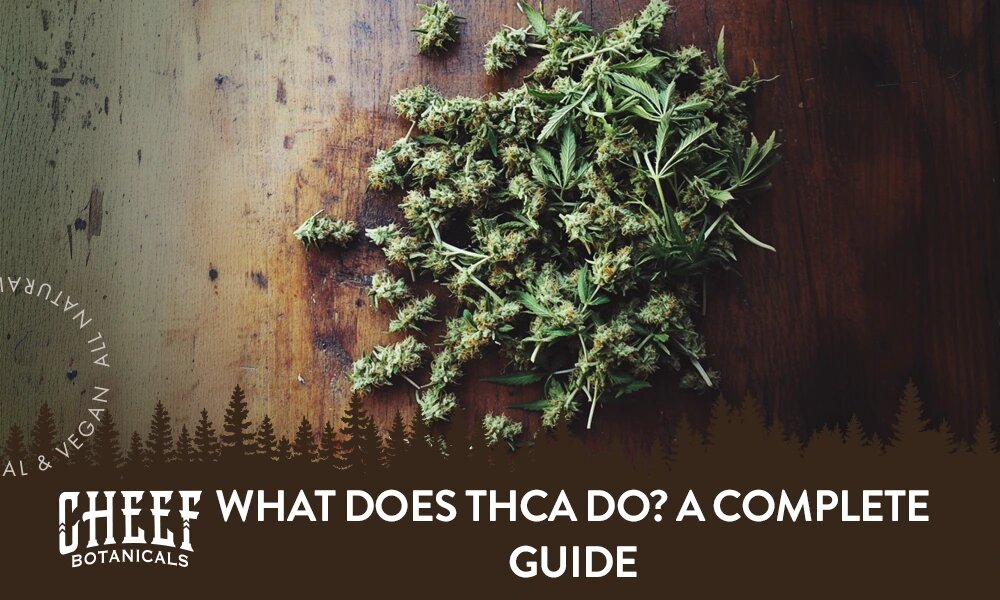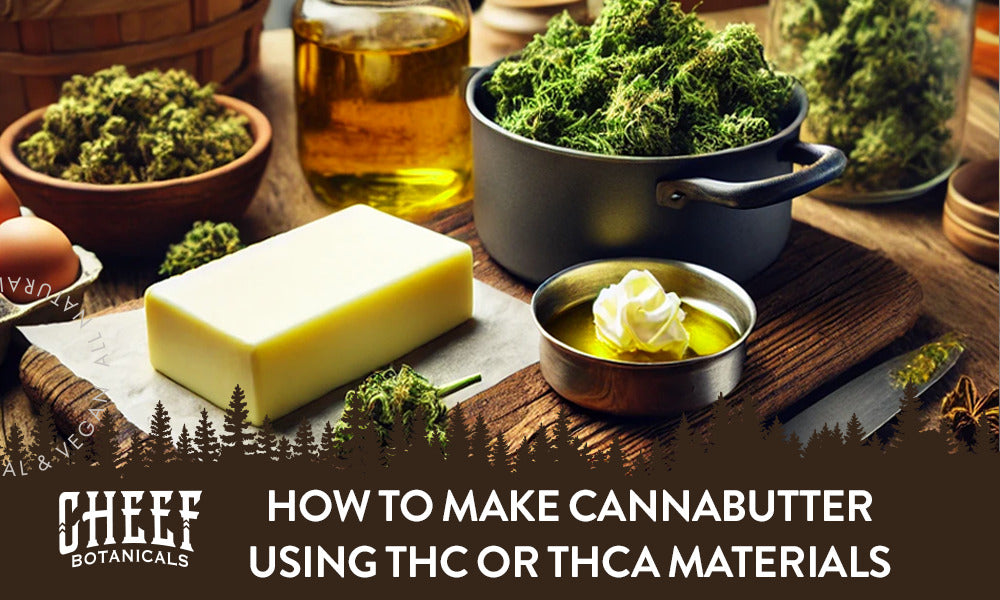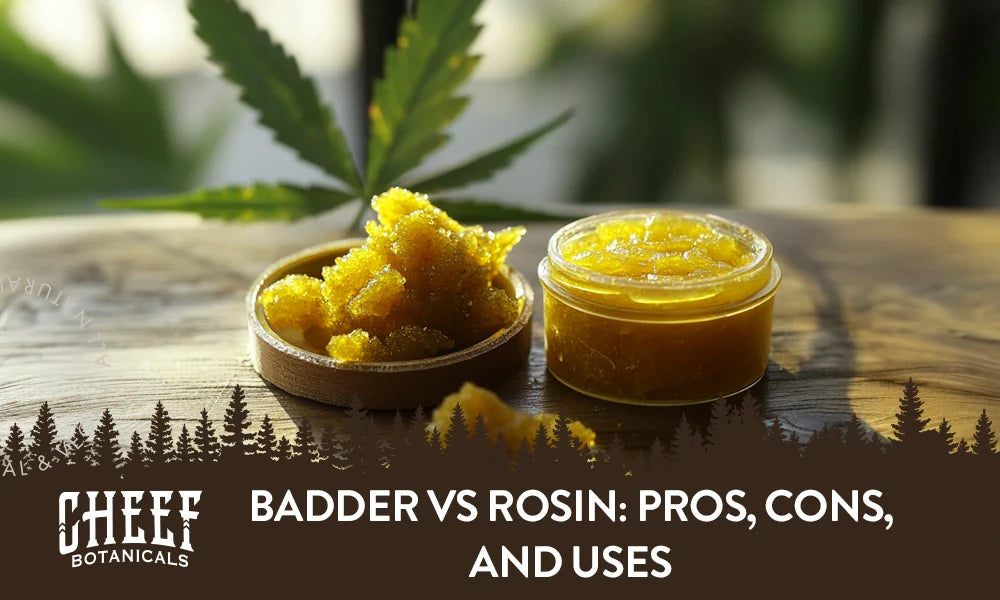Did you know THC doesn't start out as THC in the cannabis plant? Instead, it starts as THCa, a non-psychoactive cannabinoid. So, what does that mean and what does THCa do?
THCa stays in its raw form until heat or light converts it into THC. This process changes THCa into THC, the compound responsible for cannabis’s familiar "high" effects.
Let's review the differences between THCA and THC, how they work, and the potential benefits of THCA. We'll also go over different THCA products, how they interact with the body’s endocannabinoid system, and the different ways to consume THCA.
What Is THCa?
In its natural state, THCa (tetrahydrocannabinolic acid) is a non-psychoactive cannabinoid. It’s the raw form of THC, present in freshly harvested Cannabis sativa before the plant is dried or heated. Unlike THC, THCa doesn’t produce a "buzz" or "high" unless it’s exposed to heat or light in a process called decarboxylation. This chemical change allows THCa to convert into THC, activating its familiar effects.
Chemically, THCa and THC are similar, but their small difference keeps THCa from getting you faded. However, THCa still provides therapeutic properties and it's continually gaining attention for its potential health benefits, versatility, and unique role in cannabis products.
Is THCa Psychoactive on Its Own?
No, THCa is not psychoactive by itself. Its structure prevents it from binding to the brain’s CB1 receptors, which means it can’t create the elevated effects that THC is known for. When THCa is consumed raw, like in edibles, it remains non-psychoactive.
However, once enough heat or light is applied, THCa converts into THC, unlocking its psychoactive properties. For those looking to avoid these effects, edible THCa products are a great alternative.
THCa and THC: What’s the Difference?
THCa and THC are similar but not the same. The biggest difference is their structure. THCa has a carboxylic acid group, making it larger and unable to interact with the brain’s cannabinoid receptors. This explains why THCa doesn’t produce psychoactive effects in its natural form. THC, on the other hand, binds easily to receptors and delivers its well-known psychoactive properties.
Decarboxylation is what transforms THCa into THC, creating those elevated effects. While THCa products are great for raw consumption or potential therapeutic benefits, THC is preferred by those seeking a head change along with the other benefits. Understanding these differences helps you decide which one works best for your needs.
How Does THCa Work in the Body?
THCa interacts with the body in unique ways that don’t cause psychoactive effects. It works with the endocannabinoid system (ECS), a network that helps regulate balance in areas like sleep, mood, pain, immune response, and digestion. Instead of binding directly to receptors like THC does, THCa influences the ECS indirectly. This makes THCa products a natural option for those looking for support without the elevated effects of THC.
Interaction with the Endocannabinoid System
As mentioned, the endocannabinoid system (ECS) helps the body stay balanced. While THC binds directly to CB1 receptors in the brain to cause psychoactive effects, THCa doesn’t attach to these receptors. Instead, it may provide indirect support, helping the ECS work more efficiently.
THCa’s Potential Role in Supporting Wellness
THCa is becoming popular for its potential to support overall wellness. Research suggests it may help ease physical discomfort, support brain health, and possibly ease queasiness. Unlike THC, THCa is non-psychoactive, so it can offer benefits without any mind-altering effects. Many people are exploring THCa consumption as a natural way to add balance to their routines.
Potential Non-Psychoactive Benefits of Raw THCa
THCa is gaining attention because of its wellness benefits and the fact that it does not cause mind-altering effects. It’s a natural option for those who want to feel supported and balanced. From physical relief to brain health, THCa consumption offers a range of potential wellness benefits.
May Ease Physical Discomfort
THCa might help with physical discomfort. Research shows its potential for soothing inflammation, making it a gentle option for daily use. Since THCa doesn’t produce psychoactive effects, it’s easier to use without worrying about feeling sedated. Many people explore THCa products for natural relief and wellness support.
Calming and Relaxation Support
If you’re looking for a natural way to relax, THCa products might be worth exploring. THCa can promote calm without changing your mental state. Some people find that THCa consumption helps them wind down and feel more centered. This makes THCa a popular option for natural relaxation.
Potential Neuroprotective Properties
Studies suggest that THCa may potentially support brain health by protecting nerve cells from damage. This potential makes THCa consumption an exciting alternative for those interested in long-term wellness. Because THCa is non-psychoactive, it’s easy to explore its benefits without the effects of THC. More research into THCa products is helping us understand how they may support brain function.
What Does Decarboxylated THCa Do?
When THCa is exposed to heat or light, it undergoes a transformation called decarboxylation, changing into THC. This process activates the "high" or psychoactive properties that THC is known for. Understanding how this conversion works helps explain the effects of decarboxylated THCa on the mind and body.
The Decarboxylation Process Explained
Decarboxylation happens when THCa is exposed to heat through methods like smoking, vaping, dabbing, or cooking. It also happens naturally through light exposure but this conversion is much slower than through heat. During this process, the carboxylic acid group in THCa is removed, releasing carbon dioxide and transforming it into THC.
Effects of Decarboxylated THCa on the Mind and Body
Once THCa converts to THC, it binds to CB1 receptors in the brain, creating psychoactive effects like euphoria or altered perception. These effects vary based on factors like dosage and individual tolerance. Decarboxylated THCa also interacts with the body to promote a range of sensations, from relaxation to discomfort relief. This makes it a central part of the experience many associate with cannabis consumption.
How to Use THCa
There are simple ways to enjoy THCa, whether you prefer its raw form or want to activate it into THC. Some people stick to raw cannabis for a natural, non-psychoactive option, while others use heat to unlock its psychoactive properties. Knowing how to use THCa products helps you find what works best for your needs.
Consuming Raw THCa for Everyday Use
Consuming raw cannabis is a great way to experience its benefits without psychoactive effects. You can try raw cannabis juice or add fresh cannabis plant material to smoothies for a simple, healthy option. These methods keep THCa in its natural state, offering potential wellness benefits without altering your mental state. For anyone looking for a gentle, plant-based boost, raw cannabis is an easy and effective choice.
Methods to Decarboxylate THCa
If you want to convert THCa into THC, you’ll need to use heat through a process called decarboxylation. Here are some common ways to do it:
- Smoking or Vaping. The easiest and fastest way to decarboxylate THCa. The heat from a flame or vape immediately converts it into THC as you inhale.
- Baking in the Oven. For edibles, heating raw cannabis at around 240°F for 30-40 minutes is a simple way to decarboxylate THCa.
- Using a Decarboxylation Device. Specialized tools make it easy to heat cannabis evenly for precise THCa to THC conversion.
- Cooking with Cannabis. When preparing dishes like infused oils or butter, the cooking process naturally decarboxylates THCa while integrating it into your recipes.
How THCa Works When Inhaling Flower, Vapes, and Concentrates
Inhaling THCa flower, vapes, or concentrates is a fast way to enjoy cannabis products. When heat is applied, THCa converts into THC, activating its psychoactive properties. This process happens instantly as you smoke or vape, making it great for those who want quick results.
Once converted, THC interacts with your cannabinoid receptors, creating effects that range from relaxation to an elevated mood. THCa flowers and concentrates are easy to use, offering flexibility and control over your experience. Many people prefer this method for its convenience and the ability to feel the effects right away, whether at home or on the go.
Cheef Botanicals’ Premium THCa Options

At Cheef Botanicals, we have THCa products to fit every need. Whether you want to enjoy the natural benefits of raw cannabis or experience the effects of THC, we’ve got you covered. Here’s a look at our top THCa options and what makes them stand out.
- THCa Flower. Perfect for both raw and heated use, our THCa flower can be added to smoothies or salads for non-psychoactive cannabinoid benefits. For an elevated experience, try smoking or vaping strains like Gelato (Hybrid) or Sex Panther (Sativa). Each strain offers distinct flavors and effects for customizable cannabis consumption.
- THCa Diamonds. With over 80% THCa, these concentrates are incredibly potent and pure. The Spritzer strain delivers bold flavors and effects through our whole-plant extraction process. It’s a top pick for those seeking high-potency applications.
- THCa Live Rosin. For a smoother experience, our Lemon Cherry Gelato Live Rosin offers sweet, citrusy flavors. This solventless concentrate ensures a clean and pure cannabis experience, perfect for enthusiasts who value taste and quality.
- THCa Disposables. Ready-to-use and convenient, our THCa Disposables come in popular strains like Blue Dream and Berry Gelato. They’re perfect for on-the-go cannabis lovers who want quick, reliable effects.
- THCa Vape Carts. These 510-threaded vape carts provide premium quality and flexibility. Available in strains like Durban Poison and Lemon Cherry Gelato, they deliver delicious flavors and fast-acting effects, ideal for everyday use.
THCa vs. Other Cannabinoids
THCa stands out among cannabinoids found in cannabis plants because of its unique properties. While CBD, CBG, and Delta 9 THC are also well-known, each one interacts with the body differently. Here’s how THCa compares to these other cannabinoids.
- THCa vs. CBD. Both THCa and CBD are non-psychoactive cannabinoids, but they have different uses. THCa flower is often linked to potential therapeutic properties like easing discomfort and supporting digestion. CBD, on the other hand, is widely used for relaxation and overall balance without the need for heating or conversion.
- THCa vs. CBG. CBG is called the “mother cannabinoid” because it helps create other cannabinoids, while THCa is the precursor to THC. THCa consumption is tied to benefits like soothing physical discomfort, while CBG is often used to support sleep and relaxation. Both are non-psychoactive compounds in their raw forms.
- THCa vs. Delta 9 THC. The main difference is their psychoactive properties. THCa is non-psychoactive until it’s heated, while Delta 9 THC is the psychoactive compound responsible for the elevated effects of cannabis. THCa products let you enjoy cannabis in a natural state or convert it to THC for a different experience.
Is THCa Legal?
The legality of THCa depends on both federal and state laws, which can sometimes feel confusing. Federally, THCa is legal under the 2018 Farm Bill if it comes from hemp plants with less than 0.3% THC on a dry weight basis.
This means THCa products, like raw cannabis or THCa flower, are allowed as long as they meet these requirements. However, when THCa converts to THC through heat, the THC levels could exceed the limit, which may affect legality.
State laws can be more strict and vary widely. Some states allow THCa consumption, while others may limit or ban products that could produce psychoactive effects, like THCa concentrates or flowers. To avoid issues, it’s best to check your state’s specific rules before buying or using cannabis products containing THCa.
Related Post: Potential THCa Side Effects [Concerns & Risks]
Final Thoughts - What Does THCa Do?
THCa is a versatile cannabinoid found in live cannabis plants. In its raw form, it’s a non-psychoactive compound that doesn’t create the same effects as THC. Instead, it’s known for its potential therapeutic properties, like soothing physical discomfort and possibly supporting brain health.
By consuming raw cannabis or using THCa flower, you can explore its natural benefits without experiencing psychoactive effects. When heated THCa activates its psychoactive properties. This flexibility makes THCa products suitable for both wellness-focused consumers and those seeking a more elevated experience.
As more cannabis research is conducted, the benefits of THCa continue to grow in popularity. Whether you’re exploring cannabis products for wellness or curiosity, THCa consumption offers something unique for everyone.



 Watermelon OG - Top Seller
Watermelon OG - Top Seller
 Runtz THCa Flower - Excellent Choice
Runtz THCa Flower - Excellent Choice
 Han Solo THCa Flower - Highly Rated
Han Solo THCa Flower - Highly Rated
 Space Junkie THCa Flower - Good Value
Space Junkie THCa Flower - Good Value



Leave a comment
This site is protected by hCaptcha and the hCaptcha Privacy Policy and Terms of Service apply.